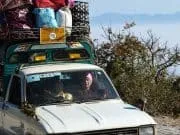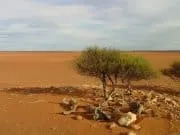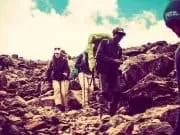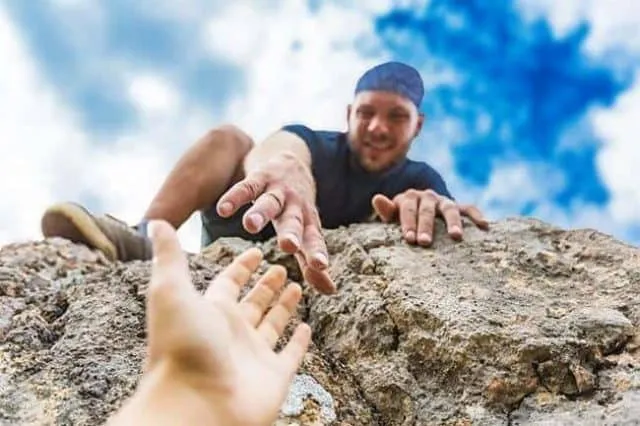When you’re facing your possible demise, you’ll do whatever it takes to keep yourself and, more importantly, your family out of harm’s way.
A powerful, but simple statement that the vast majority of people happen to agree with.
Research and history have proven time after time that being part of a survival group enhances your chances of escaping the long, dark reach of the grim reaper. Even if you’re a loner and find it difficult to put your trust in a bunch of total strangers.
I’m going to spend the better part of this article to prove the following statement beyond any doubt:
Joining (or starting) a survival group will noticeably improve your chances to keep safe.
But there’s a catch.
Let’s say that you are a loner by nature. First you’ll have to understand why joining a survival group benefits you.
Table Of Contents
A Survival Group Increases Your Survival Chances
How does a group behave during trying circumstances?
Let’s take a look at the 2010 Haiti earthquake. We are interested in its aftermath, more exactly. It’s effect on the native people.
It sounded like a tornado, followed by a bomb dropping.
…said Frantz Florestal of Atlanta who witnessed the catastrophe during his visit to Port-au-Prince.
Haiti’s economy and stability was a nightmare to begin with. Over 70% of its population lived under the poverty line. Add a 7.0 Magnitude quake that struck close to the capital city and you have a recipe for disaster.


According to some sources, the earthquake triggered a “frenzy of looting”. It all turned out to be isolated events in the end. The “frenzy” was nothing more than a bunch of people that were suffering from starvation, thirst and poor hygiene. People that were trying to get a piece of bread and a glass of clean water for their dirty, bloodied, surviving children.
But this is how most of the locals chose to respond to the catastrophe: “Rescue efforts began in the immediate aftermath of the earthquake, with able-bodied survivors extricating the living and the dead from the rubble of the many buildings that had collapsed.”
Dr. Chris Cocking who specializes in group behavior analysis, along with his colleagues John Drury and Steve Reicher, have been examining what the psychologists call collective resilience. This is what Dr. Cocking has to say after taking a look at incidents from the past 4 decades : “In emergencies, the norm is cooperation. [..]Selfish behaviour is very mild and tends to be policed by the crowd rather than spreading”
Their study of mass behavior during emergencies (listed in the Resources section at the bottom of the article) also mentions this:
Mutual concern and helping was widespread while personal selfishness was rare.
Yes, you may argue that there are various circumstances that will influence your group survival chances one way or another. Quite possible.
A Survival Group Helps You Master Shock & Panic
Terms like mass panic, shock, stampede and looting fly very loosely during an emergency. This happens in part because these are some of the reactions to the catastrophe. But also because the people reporting point out these isolated incidents first. Mainly because they carry a higher emotional impact and make you relate better to an event that might take place thousands of miles away from where you are.


These are a few of the more important factors that influence group survival:
- shock – for the first few moments, people might not understand what is happening. It might take them a while to realize what just happened and decide how to react to it.
- freezing – usually a dangerous reaction
- panic – it happens a lot less often than popular belief would have it
- orderly behavior – even when faced with imminent death, people did not stampede, but they lined up to get out
- selflessness and co-operation – common behavior after the initial negative factors such as shock and panic have passed
- the presence of others has a calming effect – calm is good, calm is one of the things that might save your skin in an emergency
- mutual help and self-sacrifices – there are numerous cases in which these “noble” traits have gone a lot further than just helping family and friends and have benefited total strangers.
An analysis of the World Trade Center terrorist attack found that:
classic panic action or people behaving in an irrational manner was noted in [just] 1/124 (0.8%) cases
Prevent & Respond To Emergencies
Before looking at some of the features that make a survival group more likely to save your hide, we need to ask 2 questions. Yes, we really do:
- If there is an emergency, how close are you to its focal point (how long before it threatens you)?
- Are you joining a group as a preventive action (there’s no imminent danger)?
Imminent Danger
What if you do not have time to build a survival group? What if your survival group is just the people that you have around you when the catastrophe takes place?
This is what you have to do:
- find a larger survival group to join. There is safety in numbers.
- make sure everyone understands what is happening. Research shows that one of the main factors that determine if someone survives or not is how fast they recognize and accept that there is an immediate threat to their safety.
- find an exit or a way to put distance between your group and the threat.
Survivalists Groups
Joining A Prepping Group
Some survivalists feel safer when they join a local or online survival group, even if there is no looming danger. Some of the reasons for joining such a group are:
- meeting new, like-minded people
- planning and making preparations for “shtf”
- discussing preparedness scenarios
- taking part in drills and games

Before you start looking for things such as tinfoil hats and conspiracy theories, hear me out.
Planning in advance has been proved time and again to give you a better chance at success. You plan to succeed, not to fail. Businesses, governments, and organizations across the world plan in advance for desired outcomes and against potential failure of those plans. Survivalism is no different, there is power and merit in planning against potential hazards. Just ask FEMA.
How To Find A Prepper Group
Search for online or local survival groups:
- survival forums such as https://www.prepperforums.net/ or https://www.myprepperforum.com/
- Meetup
Some other groups that you might be interested in are homesteading, wilderness survival, mountaineering, hiking, camping and navigation groups.
Connect With People You Can Trust
Trust is the most precious currency you can have circulating in your survival group.


Here’s how to promote trust in your group:
- set a good example
- get to know the other members and their motives for joining the group
- give everyone small, easy to accomplish tasks. They will feel proud when they accomplish those tasks and tighten their connection to the group.
- delegate responsibilities based on strengths and survival skills.
You Can Easily Start Your Own Group
Your survival group. Your rules. Your people.
So how do you go about convincing other people to join your newly minted survival group?
I’ll give you a few suggestions that have a lot of merit:
- approach people that have similar interests and ask what they think about getting together for certain activities. See what they think about preparedness games and drills based on emergency or “doomsday” scenarios.
- make the activities sound more like a survival game. Because that is what they really are, but with the added bonus of preparing you for real life hazards. Compare them to capture the flag and paintball games. You’ll most likely remove the suspicion that comes with hearing the word “prepping”.
- once you get a few members, set a goal. It might be something like “Put in place a plan for emergency prevention & emergency response. Supply our members with tools and training that increases situational awareness and the likelihood to stay safe during the hazard.” Oh, add “meet new people and have some fun while doing it” if do not feel too official.
- set some ground rules. These might include a hierarchy for the group. Assign roles based on skills because you don’t want to have it any other way in a real emergency.
- set meeting schedules and project deadlines – make a comfortable schedule that everyone can keep. Consider online meetings and group chat.
- split expenses and responsibilities – everyone can contribute something, based on their skills.
- connect with other survivalist communities – make contact with other nation and, why not, international prepper groups.
Participate In Preparedness Activities
Here are a couple of ways how you can keep your survival group more active, useful and entertaining.
Imagine dangerous scenarios & find ways to survive them
There is no right or wrong way to do this. Almost every type of scenario is allowed, as long as it doesn’t offend participants, doesn’t incite them to do dangerous or illegal things in real life. Everyone needs to understand it is just a game or drill meant to be fun and prepare you at the same time:
- anchor some of the scenarios in reality. Make them about hazards that could take place in your area. Some examples are tornadoes, winter blizzards, getting lost in the forest, attack by wild animals, dealing with criminals or gangs, etc
- make other scenarios outlandish and extravagant. Just because they are not very likely to take place doesn’t mean that they are not useful as an exercise. And they will still be loads of fun
- organize the game/drill participant responses in 3 layers – prevention, response and recovery
Use your group’s knowledge & strengths

Photo by geopungo
Hold special sessions where your group experts teach the others how to organize their survival supplies, put together a bug out bag or design a comprehensive emergency plan. Some examples would be a hunter teaching others how to snare a rabbit, a nurse showing the correct way how to dress a wound, etc.
Organize outdoor gatherings
Not everything has to be about prepping.
Meeting people for a barbecue, forest games and outdoor sports will benefit your group tremendously. You’ll form stronger connections, build trust, learn how to work as a team in any kind of setting and have fun while doing all that.
Devil’s Advocate
As you probably know by now, Survival Report prides itself in analyzing most, if not all of the angles that are relevant to the article we’re writing. That includes views that are opposed to our own. You know, just to keep things fair.
In this case it is reasons why you should not join a larger survival group. Some of the most common reasons are:
- distrust – A prepper should trust no one
- isolationism – A crash will bring out the worst in people
- dissent – desperate hoards, martial law to restore order, persecution of dissidents, violence, and death
We actually have one, wait, two things in common with people that harbor these beliefs:
- we believe, that, yes, sometimes shtf
- we believe in the power of making timely preparations against hazards
So, we do not want to criticize these people. After all, we do share some beliefs. But we courteously disagree with their projections of what will happen during and after a disaster.
Resources:
The mass psychology of disasters and emergency evacuations by Dr. John Drury and Dr. Chris Cocking Department of Psychology University of Sussex
How to survive a disaster by Michael Bond
10 Facts About The Haiti Earthquake

















